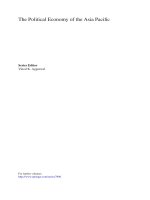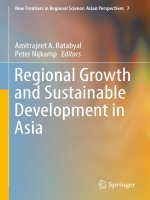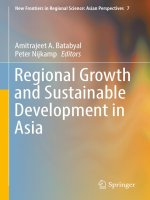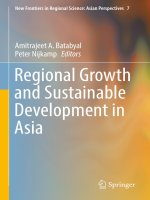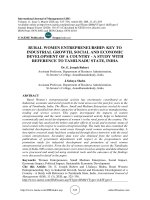Economic growth and economic development 182
Bạn đang xem bản rút gọn của tài liệu. Xem và tải ngay bản đầy đủ của tài liệu tại đây (83.59 KB, 1 trang )
Introduction to Modern Economic Growth
checks on the behavior of politicians and leaders, the identity of leaders seems to
play almost no role in economic performance.
Given these considerations, we conclude that models emphasizing luck and multiple equilibria are useful for our study of the mechanics of economic development,
but they are unlikely to provide us with the fundamental causes of why world economic growth started 200 years ago and why some countries are rich while others
are poor toady.
4.3.2. Geography. While the approaches in the last subsection emphasize the
importance of luck and multiple equilibria among otherwise-identical societies, an
alternative is to emphasize the deep heterogeneity across societies. The geography
hypothesis is, first and foremost, about the fact that not all areas of the world are
created equal. “Nature”, that is, the physical, ecological and geographical environment of nations, plays a major role in their economic experiences. As pointed out
above, geographic factors can play this role by determining both the preferences and
the opportunity set of individual economic agents in different societies. There are at
least three main versions of the geography hypothesis, each emphasizing a different
mechanism for how geography affects prosperity.
The first and earliest version of the geography hypothesis goes back to Montesquieu ([1748], 1989). Montesquieu, who was a brilliant French philosopher and
an avid supporter of Republican forms of government, was also convinced that climate was among the main determinants of the fate of nations. He believed that
climate, in particular heat, shaped human attitudes and effort, and via this channel, affected both economic and social outcomes. He wrote in his classic book The
Spirit of the Laws:
“The heat of the climate can be so excessive that the body there
will be absolutely without strength. So, prostration will pass even to
the spirit; no curiosity, no noble enterprise, no generous sentiment;
inclinations will all be passive there; laziness there will be happiness,”
“People are ... more vigorous in cold climates. The inhabitants
of warm countries are, like old men, timorous; the people in cold
countries are, like young men, brave...”
168



